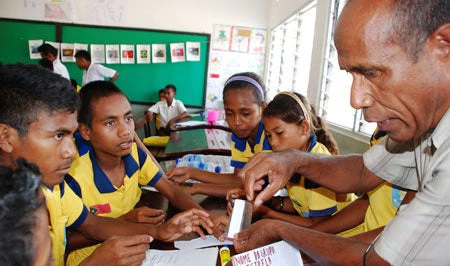
Imagine what the world would look like if there were no teachers, what our life would be like, and what your surroundings would look like. Is it a modern world like today or just jungles with no civilization? Take your time and imagine.
October 5th is World Teacher’s Day, a day for us to remind ourselves of teachers around the world and the awe-inspiring job that they do. And the fact that they have given their time and energy to make our world a better place.
Talking about teachers all over the world, I will take this opportunity to invite you to pay special attention to all the teachers in Timor-Leste, who have struggled to build learning from the ground up after 1999. When trained teachers fled the country during the conflict, only very few teachers with adequate skills and knowledge remained.
In a conversation with Fr. Plenio Martins, an influential educator in Ulmera Liquica District, he pointed out the challenges facing the country’s education system, even today. We still lack very good quality teachers, and there are also problems with equipment and school materials. Almost all schools lack libraries. Timor-Leste itself doesn’t have a national library. This is a big challenge for education, particularly for the little children to learn”.
Supporting teachers in the work they do will be of the utmost importance for Timor-Leste, and ensuring they have the resources to adequately teach their students.
With the support of the World Bank and other partners, the government is investing in strengthening the country’s education system by designing an improved curriculum, conducting training for teachers and school administrators .
In a interview with then-Director General of the Ministry of Education, Domingos de Deus Maia, he indicated that more effort by the government of Timor-Leste is needed to promote training programs for teachers, ministry staff, finance and school directors:
“We now have many teachers with bachelor degrees and many who have received training, so the majority of teachers have been trained through the system, and can start to respond to the needs of the country”.
Afonso da Cruz is a close friend of mine and a teacher who is currently studying his teacher masters degree at Universidade Estadual da Paraíba in Brazil. He loves teaching. While he was working for the United Nations as a language assistant, he used to do volunteer work at schools and provide free English courses in his village.
I had a chat with him through Facebook because I was interested to learn more about his years of experience as a teacher in Timor-Leste. “Teaching is not a job, but a kind of special calling or passion,” he told me. “I left my previous work with a good salary, much better than being a teacher, because I liked teaching more than any other job that I ever did before. It requires a constant process of learning to help improve your teaching which brings new experiences and knowledge”.
This kind of dedication and passion for teaching is not unusual among the teachers I have spoken to in Timor-Leste, and helped bring confidence for me about our country’s future.
Do you have examples of how dedicated teachers have helped you or your country to develop?


Join the Conversation